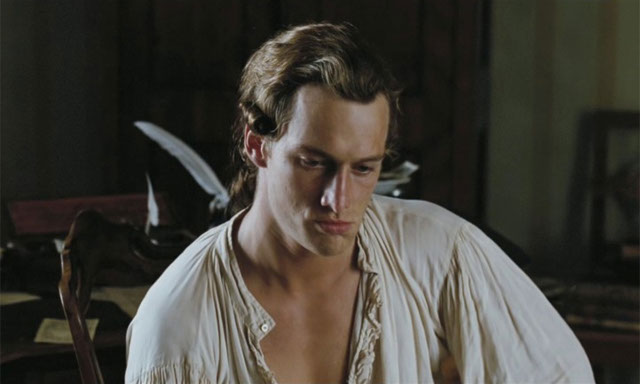
Film: Goethe
Country: Germany
Year of Release: 2010
Director: Philipp Stolzl
Screenwriters:Alexander Dydyna, Christoph Müller, Philipp Stölzl
Starring: Miriam Stein, Alexander Fehling
♥♥♥
Goethe is loosely based on The Sorrows of Young Werther, a prose work consisting of a series of letters which first brought German poet and novelist Johan Goethe (played by Alexander Fehling in the film) popular fame. Telling the semiautobiographical story of the writer’s youthful sojourn in the fictional village of Wahlheim and his enchantment with a beautiful young woman named Charlotte Buff (Miriam Stein) who becomes engaged to a businessman (Moritz Bleibtreu) some years older than her, director Philipp Stolzl’s biopic is a big budget historical drama that is short on both history and drama. Fusing details from Goethe’s story with the arc of his rise to fame, the film provides scant evidence of the complexity of Goethe’s powerful mind, presenting instead a genial and adorable puppy of a man.
For a writer whose body of work has cast a shadow over all of Western literature, you might expect something of an, er, literary bent from a film based on Goethe’s early life. But Goethe, like Shakespeare in Love and a disturbing proportion of biopics in general, uses the subject’s historic fame as a springboard to tell a story that has little to do with literature, the creative process, or even the biographic details of his life. Instead, the film feels more like a period rom-com that is short on laughs, although full of gentle if remarkably ordinary bemusement. And, every now and then, as if the film’s suddenly remembered that it’s dealing with one of the most significant figures in Western culture, it throws in the odd reference to rationality versus romanticism before reverting to its stolid lovers’ triangle.
While the film is lavishly produced in terms of set and costumes, it is lacking in both historical depth and convincing human drama. It is, more than anything, a film that is well meaning in it intentions. But niceness is seldom a cinematic virtue by itself, particularly when the film extends that virtue to all of its central characters. And when less than noble sentiments are expressed by minor characters, they are tonally consistent with the humour of cartoons. But what ultimately makes the film’s sugar-coated approach to Goethe so ineffectual is that that the relationship between Goethe and Charlotte is itself so devoid of any kind of real passionate conviction, that it’s hard to see the connection between the narrative and a work of fiction that for a time seemed to entrance the whole of Europe.
Goethe is most notable for its lead performance from Alexander Fehling, who, despite the fact that his acting style is out of synch with the rest of the film, has a charisma, presence and physical beauty that raises him above the film’s cardboard characterisation. The only other notable performance comes from Stein, who, like Fehling, provides a performance that is essentially modernist and not grounded in the period drama by which both actors are surrounded. This contrast of acting styles might, in the hands of a more daring director, be taken as a cinematic conceit, but here it just seems like poor direction.
Finally, it seems likely that we’ll bee seeing a lot more from Fehling in the future, as he makes the cross-over from arty European fame to the more ubiquitous English-language variety. He’s already appeared in Inglorious Basterds and also takes the lead in the excellent The River Used to be a Man, which he co-wrote and which will feature at the Durban International Film Festival next month. Don’t miss it.
© PETER MACHEN 2017